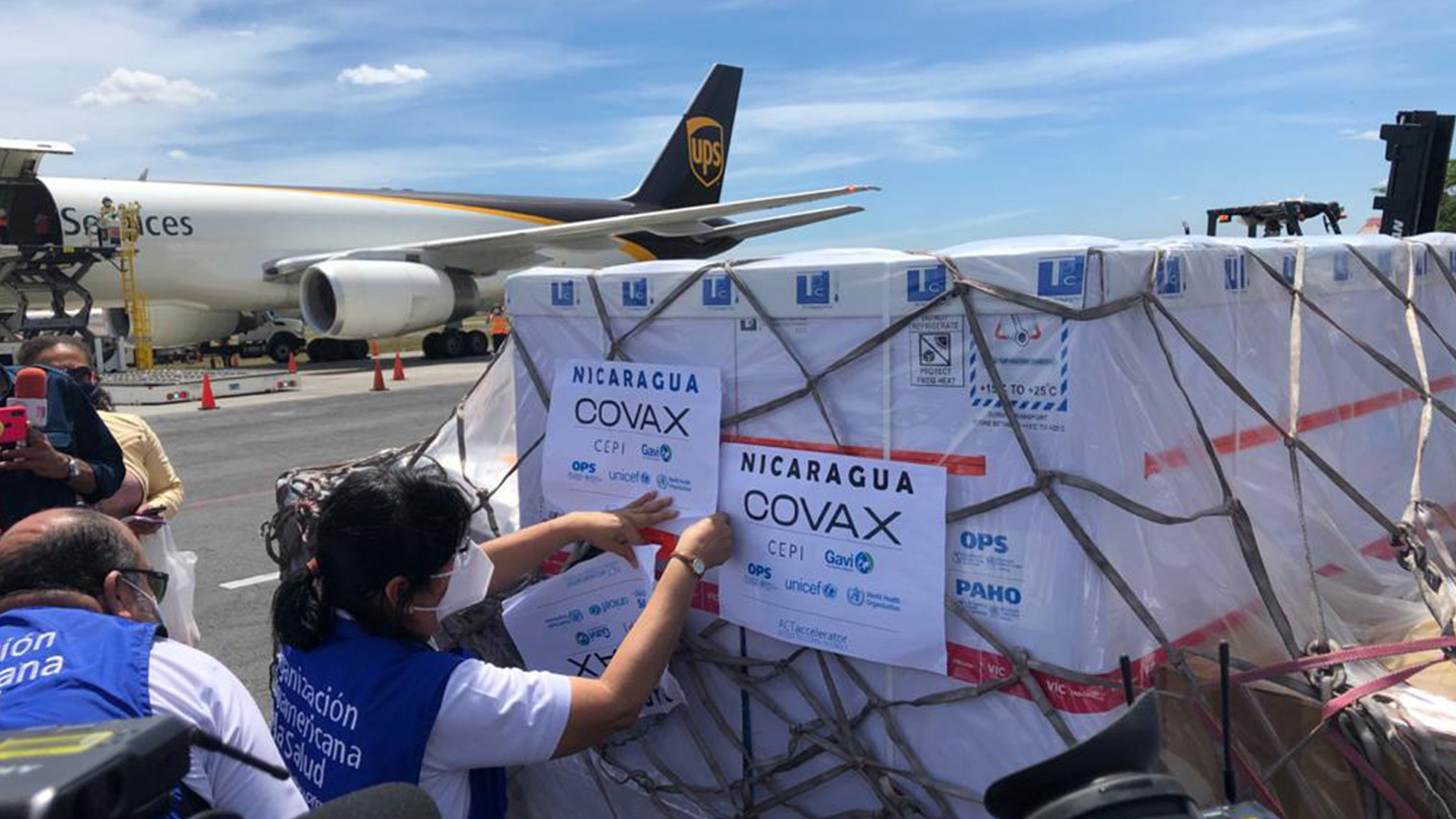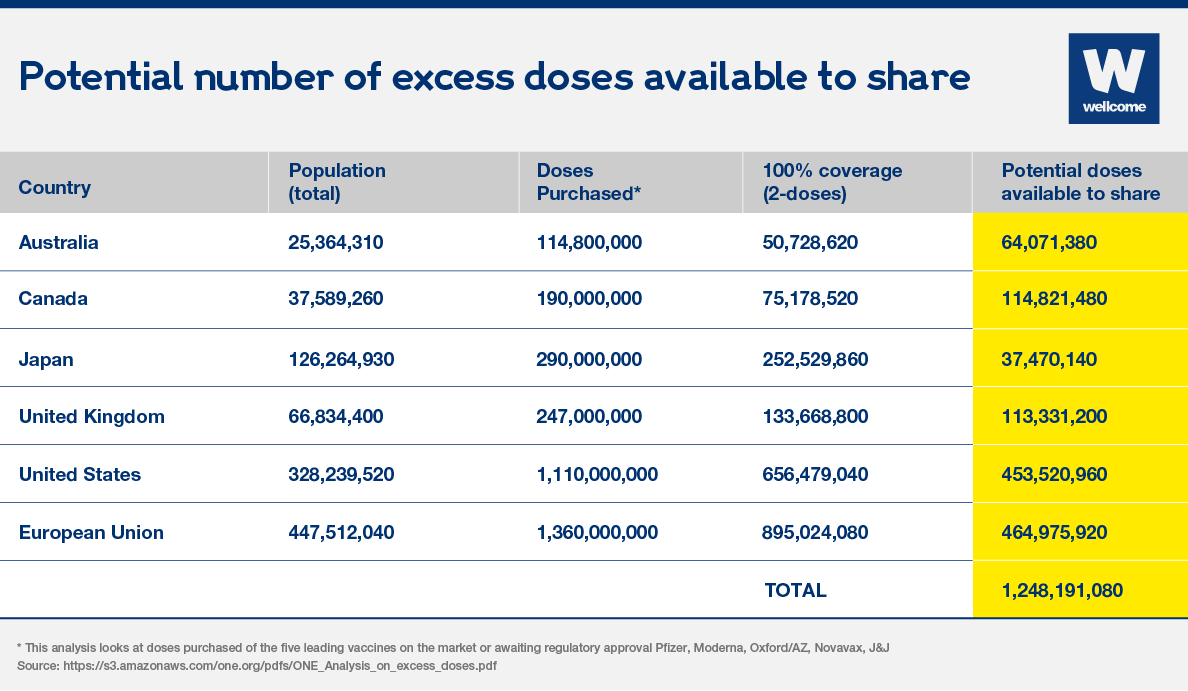Why we need to share vaccine doses now and why COVAX is the right way to do it
Covid-19 vaccination efforts are picking up worldwide, bringing hopes of returning to a more normal life. Vaccines are now starting to reach countries across the globe through the COVAX initiative, set up to promote equitable access to vaccines worldwide. But the vast majority of doses administered so far – nearly 80% – have been in just 10 countries.

COVAX-supported Covid-19 vaccines arriving in Nicaragua in March 2021.

This inequity poses a new danger, and not just to people in countries with low vaccine supply.
To safeguard our hard-won progress towards ending the pandemic, we need urgent international action to achieve more equitable global access to vaccines.
Countries that have ordered more vaccine doses than they need, like the UK, are best placed to take the lead. They can do this by sharing doses now, in parallel to their own national vaccine roll-outs, and setting out a timetable to scale that up over the coming months as they receive more and more doses.
And to have maximum effect, these donations must be made through COVAX, which will ensure efficient and equitable targeting of doses based on local need and capacity. The ACT Accelerator, which runs COVAX, also needs to be fully funded to make this ambition a reality.
Sharing will help to end the pandemic sooner for everyone
Only by driving down infection and transmission everywhere can we hope to end the pandemic. We have seen worrying variants emerge from countries with high levels of infection and then travel around the world. Only by ending the pandemic everywhere can we be safe at home as well. Sharing vaccine doses now to stop new variants emerging in other countries is in everyone’s self-interest.
Several countries have ordered far more vaccine than they need
The UK, US, EU, Japan, Australia and Canada (among others) have purchased more doses than required to vaccinate their entire populations. Between these 6 there are over 1 billion ordered doses of the 5 leading vaccines available, enough to vaccinate all the vulnerable groups in every country around the world.
Vulnerable people around the world should be prioritised
We have seen vaccines being rolled out at an unbelievable speed in some countries. Here in the UK for example, with the over-50s being invited for vaccination, we are close to vaccinating 99% of those at high risk of dying from Covid-19. However, in many countries, vulnerable populations such as the elderly and healthcare workers are still unable to access vaccines. Sharing doses in parallel to our own roll-outs will mean we can protect vulnerable groups around the world who have a much higher chance of severe illness or death from Covid-19.
Stockpiled vaccines may become unusable
Countries that have purchased lots of surplus doses may be planning to keep them for use as boosters in the future, but there is a risk that they may not be suitable. We must consider dose shelf-life, whether boosters are effective for those already vaccinated, whether we can mix and match different vaccines and what strain of the vaccine is dominant in a country at that time of an outbreak. Given the rise of new variants, countries may have to purchase new vaccines for booster campaigns developed specifically for those variants. This could leave millions of vaccine doses unused in the long term when they could be saving lives in the short term.
It saves money to share
The global economy has been badly damaged by Covid-19, and a proper recovery will have to be global too. Even if some countries’ populations become fully vaccinated so that they can lift restrictions, their economies will continue to suffer until their international trading partners are vaccinated too. Analysis has shown that for every $1 spent on supplying poorer countries with vaccines, high-income countries would get back about $4.80 through the boost to the global economy. Dose-sharing is clearly not just a charitable act but one of economic self-interest too.


Some countries, including Chile, the US and Australia, have already started talking to neighbouring countries about sharing doses directly, but it is crucial that we take a coordinated approach through COVAX rather than use lots of piecemeal individual agreements.
To ensure those who need them most receive vaccines
COVAX was built with global equity at its heart. Donations outside of COVAX risk a fracturing of the global response, based on the idiosyncrasies of bilateral diplomacy, that could leave vulnerable populations around the world locked out of access to vaccines. COVAX operates in line with the World Health Organization Allocation Framework, so donated vaccines will go where they are needed most.
It makes sense practically to share through COVAX
Sending vaccine doses between countries involves huge complexity. There are regional and national regulations to comply with, as well as delivery and storage needs for the different vaccines such as extreme cold chain for Pfizer-BioNTech doses. COVAX assesses which countries are ready to receive which vaccines, ensuring they are used most effectively, and has experience in transporting vaccine doses. This reduces the risk of vaccines being wasted or delayed in their use due to incompatibility with recipients’ infrastructure.
COVAX can ensure safety and protection for countries, manufacturers and citizens
Any doses procured through COVAX would be quality assured and would be covered by all the legal provisions such as indemnity and liability, including the no fault compensation scheme.
The science sector in the UK, and elsewhere, has performed admirably during the pandemic. Now we need to make sure this work delivers maximum benefits for everyone.
We need urgent international action to achieve more equitable global access to Covid-19 vaccines. Countries that have ordered more vaccine doses than they need are best placed to take the lead, by sharing doses now, through COVAX.